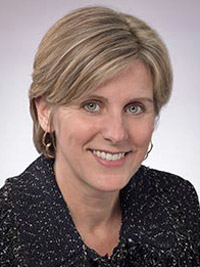Alexandra Wrage is the president of TRACE International, a non-profit membership association working with companies to raise their anti-bribery compliance standards. She is a former member of the FIFA Independent Governance Committee, Chair of the Women in International Regulatory Law Steering Committee and past chair of the American Bar Association’s Anti-Corruption Committee. Alexandra is Canadian and she studied law at King’s College, Cambridge University before moving to the U.S.

“…The gender imbalance was one of the most interesting aspects of my pro bono work with FIFA a couple of years ago. I do believe that the scandal there would have been less extensive if they’d had women on the ExCo sooner…”
Alexandra, please can you tell us about your career to date and what made you want to become a lawyer?
After completing my law degree at Cambridge University, I worked as a business litigation associate for a firm in Baltimore. From there, I moved on to a role as associate counsel for MCI Communications Corporation where I was based for some time in the Middle East, living in Damascus. Upon returning from Syria, I accepted a position as international counsel with Northrop Grumman Corporation’s global anti-bribery compliance programme.
At the time, anti-bribery compliance was not a top priority for many companies and it became clear to me that companies would soon need to do more to meet evolving compliance standards. Two years after founding TRACE and juggling the two jobs simultaneously, I left Northrop Grumman. They were very supportive and Northrop remains a TRACE member today.
It has been clear to me for as long as I can remember that legal credentials would enable me to have a positive impact on the business and global community. Studying law seemed like an obvious choice to me as a path to a number of goals. In addition, studying at Cambridge ensured that my education would include theories of justice and not just technical legal training.
For those without a legal background, please can you explain what is meant by the term ‘bribery and corruption’ and why this is so important to corporates?
Corruption is defined as the abuse of public office or position of power or trust for private gain. Bribery is the act of offering anything of value to a government official to obtain an undue business advantage. A bribe is a transaction between two or more people, while corruption is a more general term. Corruption has many hidden costs that undermine business, economic development, health and safety and public confidence in government.
Companies and individuals must understand what is meant by bribery and corruption as well as the indirect and direct costs of corruption in order to prevent corrupt behaviour and foster a culture of compliance. Companies that do not recognise the global and local costs of corruption are more likely to engage in bribery, believing it’s a victimless crime.
How is globalisation making it harder to prevent and detect bribery and corruption?
It may actually be quite the opposite. In the last decade there has been a rise in anti-bribery legislation and enforcement, both internationally and regionally, in an effort to place fighting corruption on the global agenda. Regulators worldwide have made efforts to build relationships with one another to investigate and prosecute companies and individuals involved in complex, multijurisdictional bribery schemes.
However, it is difficult to tell if the efforts made by lawmakers have kept pace with increasingly complex and global supply chains, integration of financial systems and more sophisticated bribery schemes facilitated by globalisation.
Anecdotal research suggests that organisations with better gender balance are less at risk from bribery and corruption. What evidence is there to back this up and what might be the reasons for this?
Studies by the World Bank and Transparency International have indeed found that women are generally less likely to pay bribes. Research suggests that women may simply have fewer opportunities to engage in corruption which is more likely to flow through male dominated networks. Indeed only one woman (Patricia Green, who was involved in a sophisticated bribery scheme with her husband) has been prosecuted under the FCPA [Foreign Corrupt Practices Act].
It’s a complicated issue, because if their “outsider” status makes women less likely to engage in fraud and corruption, we’ll see levels of fraud and corruption increase as women approach equal representation in leadership roles. The gender imbalance was one of the most interesting aspects of my pro bono work with FIFA a couple of years ago. I do believe that the scandal there would have been less extensive if they’d had women on the ExCo sooner. It would, at least, have disrupted the 1950’s men’s club feel of the place.
What are the career opportunities for women who want to work in this area of law and what it your advice to them?
While women now make up over half of all law school students, women in law firms still make partner at lower rates. In-house roles are often more appealing to women as they can offer more control over one’s schedule.
There are many career opportunities for women in the field of compliance. More women are being recruited by multinational companies to lead compliance and training programmes. There are also more women joining anti-bribery practice groups at law firms, as well as in regulatory positions.
Additionally there are many non-profit organisations such as TRACE that attract women who are not only interested in pursuing a career in compliance but who would also like to have a positive impact on the many constituencies affected by corruption.
What is next for you and TRACE International?
TRACE has several major projects in the pipeline in support of our mission to advance commercial transparency worldwide. We are working on certifying small and medium-sized enterprises to raise compliance standards and reduce third party due diligence costs which are no longer sustainable for most companies.
In Ghana we are currently running a campaign to offer TRACEcertification, an internationally recognised due diligence review and compliance credential, at no cost to companies that would like to be considered champions for change. My personal goal is to sustain innovation at TRACE and to continue offering companies the highest quality, but cost-effective, anti-bribery tools and services.
http://www.traceinternational.org/
https://www.facebook.com/TRACEInternational
https://www.linkedin.com/company/trace-international-inc-





